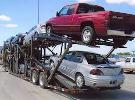
Driven to Distraction
More than 8 percent of full-time U.S. workers commute an hour or longer to work, and 61.1 percent of those with long commutes drive to work alone.
- By Jerry Laws
- Apr 01, 2013
The U.S. Census Bureau reports about 8.1 percent of U.S. workers have commutes of an hour or longer, and more than 586,000 full-time workers have "megacommutes" -- meaning they travel at least 90 minutes and 50 miles. The average one-way daily commute for all workers is 25.5 minutes, and 23 percent of workers with commutes of an hour or more use public transit, versus only 5.3 percent of all workers, the bureau reported March 5. The numbers come from the bureau's annual American Community Survey.
"The average travel time for workers who commute by public transportation is higher than that of workers who use other modes. For some workers, using transit is a necessity, but others simply choose a longer travel time over sitting in traffic," said Brian McKenzie, a Census Bureau statistician.
Titanic commutes and time wasted in traffic jams aren't the hottest transportation issue of the moment, however. The National Highway Traffic Safety Administration's December 2012 proposed rule to require event data recorders in most light vehicles manufactured after Sept. 1, 2014, stole the spotlight and prompted hundreds of people to file comments alleging the mandate would be an unconstitutional violation of motorists’ privacy rights.
"This is a horrible idea worthy of '1984.' It's intrusive and a violation of rights," a typical comment reads. "People should be able to drive where they please without the government monitoring them. Such a device would also be an expense that would add to the cost of buying cars. As a result, buying a car would be more difficult for poor people, and others would be deprived of other, better uses of their money. That's unjust. This proposal is wrong. SCRAP IT.”
”This idea is the motor vehicle equivalent of a court monitored ankle bracelet. Total invasion of privacy,” another anonymous commenter wrote. As of March 31, at least 1,016 comments had been submitted and were posted at www.regulations.gov.
The Alliance of Automobile Manufacturers filed more substantive comments on Feb. 11, 2013. Robert Strassburger, the alliance’s vice president of vehicle safety and harmonization, submitted a 15-page letter explaining that the alliance doesn't object to the concept of requiring EDRs in all light vehicles but strongly opposes NHTSA's plan to codify the mandate in a new Federal Motor Vehicle Safety Standard 405. "The Alliance believes that information stored on an EDR is the property of the vehicle owner and should ordinarily not be accessed by anyone without the owner’s permission or as required by law," Strassburger wrote. "Additionally, even with the owner’s permission, any EDR data that is included in a publicly available database should be rendered anonymous by excluding at a minimum the last six digits of the vehicle’s VIN. Alliance members that have voluntarily installed EDRs in their vehicles to date have applied these principles.”
The Insurance Institute for Highway Safety filed comments Feb. 19 supporting NHTSA’s proposed EDR mandate. EDR data will help crash researchers "better understand the influence of environmental conditions, driver input, and vehicle systems on crash causation and injury outcome. By requiring EDRs in all light vehicles," wrote Raul Arbelaez, vice president of IIHS' Vehicle Research Center, "this proposed rule will help us better understand how crashes and crash injuries occur and, therefore, how they might be prevented."
About the Author
Jerry Laws is Editor of Occupational Health & Safety magazine, which is owned by 1105 Media Inc.